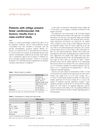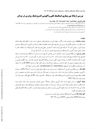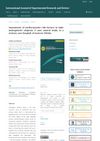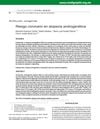Search
for
Sort by
Research
180-210 / 1000+ resultsresearch Sex Chromosome Related Dimorphism in Steroidogenic Enzymes and Androgen Receptor in Response to Testosterone Treatment: An In Vitro Study on Human Primary Skeletal Muscle Cells
Chromosomal differences affect how muscle cells respond to testosterone.

research An Updated Etiology of Hair Loss and the New Cosmeceutical Paradigm in Therapy: Clearing the Big Eight Strikes
New treatments for hair loss should target eight main causes and use specific plant compounds and peptides for better results.

research Cardiovascular Disease Risk in Women with Hyperandrogenism, Oligomenorrhea, or Polycystic Ovaries: A Systematic Review and Meta-Analysis
Women with irregular periods have a higher risk of heart disease.

research Cardiovascular Risk Associated With Gender Affirming Hormone Therapy in Transgender Population
Hormone therapy increases the risk of heart-related issues in transgender women and may affect heart health in transgender men.

research Patients With Vitiligo Present Fewer Cardiovascular Risk Factors: Results From a Case-Control Study
People with vitiligo may have a lower risk of heart disease.

research Cardiovascular Risk Markers and Thyroid Status in Young Indian Women with Polycystic Ovarian Syndrome: A Case-Control Study
Young Indian women with PCOS have a higher risk of heart disease, not linked to thyroid function but to higher levels of certain fats and homocysteine.

research Cardiometabolic Risk Factors in Women with Non-Classic Congenital Adrenal Hyperplasia
Women with non-classic congenital adrenal hyperplasia have higher risk for heart and metabolic problems.

research Cross-Sectional Study of the Association Between Skin Tags and Vascular Risk Factors in a Bariatric Clinic-Based Cohort of Irish Adults with Morbid Obesity
Skin tags in obese individuals may indicate a higher risk of heart disease and diabetes.

research Correlation of Androgenetic Alopecia and Early Onset Coronary Heart Disease in Men
Men with early-onset baldness may have a higher risk of heart disease.

research Anabolic-Androgenic Steroids and Cardiovascular Risk
Using steroids can increase the risk of heart problems.

research Cardiovascular Risk in Patients With Scarring and Nonscarring Alopecias: Assessing the Current State of Evidence
People with common hair loss conditions may have a higher risk of heart disease and related health issues.

research Comorbidities in Patients with Androgenetic Alopecia: Cardiovascular Risk Factors and Benign Prostatic Hyperplasia
People with early-onset hair loss (AGA) have a higher risk of heart disease, metabolic syndrome, and prostate enlargement.

research Evaluation of Cardiovascular Disease Risk Factors in Patients with Mycosis Fungoides
Patients with mycosis fungoides have a higher risk of heart disease.

research Correlating Cicatricial Alopecia and Cardiovascular Risk: Emerging Insights
People with Primary Cicatricial Alopecia have a higher risk of heart disease.

research Assessment of Cardiovascular Risk Factors in Male Androgenetic Alopecia: A Case Control Study in a Tertiary Care Hospital of Western Odisha
Men with male pattern baldness may have a higher risk of heart problems.

research Study of Cardiovascular Risk Factors in Patients with Androgenetic Alopecia: Metabolic Syndrome and Carotid Atheromatosis
People with early-onset hair loss have higher risk of heart issues, so early screening is important.

research Cardiovascular Risk Factors and Events in Women with Androgen Excess
Women with androgen excess, especially those with PCOS, have a much higher risk of heart disease and stroke.

research Assessment of Cardiovascular Risk Factors in Women Having Female Pattern Hair Loss
Women with female pattern hair loss may have a higher risk of heart problems.

research 5α-Reductase Inhibitors Increase Acute Coronary Syndrome Risk in Patients with Benign Prostate Hyperplasia
Taking both finasteride and dutasteride for prostate issues may raise the risk of heart problems.

research Elevated Fasting Insulin Is Associated With Cardiovascular and Metabolic Risk in Women With Polycystic Ovary Syndrome
High fasting insulin levels in women with PCOS are linked to a higher risk of heart and metabolic problems.

research Relationship Between Androgenetic Alopecia and Cardiovascular Risk Factors According to BASP Classification in Koreans
Hair loss links to high blood pressure, high fat levels, and metabolic issues, suggesting early heart disease screening.

research Left Ventricular Myocardial Mass Index and Its Correlates as an Early Marker of Cardiovascular Risk Among Nonobese Normotensive Indian Women With Polycystic Ovary Syndrome: Lessons From a Cross-Sectional Study
Nonobese, normotensive Indian women with PCOS may have a higher risk of heart problems linked to inflammation and insulin resistance.
research Comparative Study of Troponin I Level in Alopecia Areata, Androgenic Alopecia and Healthy Control Subjects
Alopecia patients have a higher risk of heart disease.

research Polycystic Ovarian Syndrome: Long-Term Health Consequences
Women with PCOS have a higher risk of diabetes, heart problems, certain cancers, and mental health issues, but early treatment can help manage these risks.

research The Association Between Metabolic Syndrome Components and Hair Loss in Both Male and Female Individuals
Hair loss may signal metabolic problems and increased risk of heart disease, suggesting people with hair loss should be checked for these issues.

research Coronary Risk in Androgenetic Alopecia
Male pattern baldness is not a risk factor for heart disease based on cholesterol levels alone.

research Androgenic Effects on Ventricular Repolarization
ADT, especially enzalutamide, may increase the risk of heart rhythm problems and sudden death in men.

research Altered Autonomic Neural Control of the Cardiovascular System in Patients with Polycystic Ovary Syndrome
People with polycystic ovary syndrome may have a higher risk of heart problems due to abnormal nervous system control of their heart and blood pressure.

research Alopecia and the Metabolic Syndrome
Men with common hair loss may have a higher risk of heart disease and diabetes, and should be checked for these conditions.